
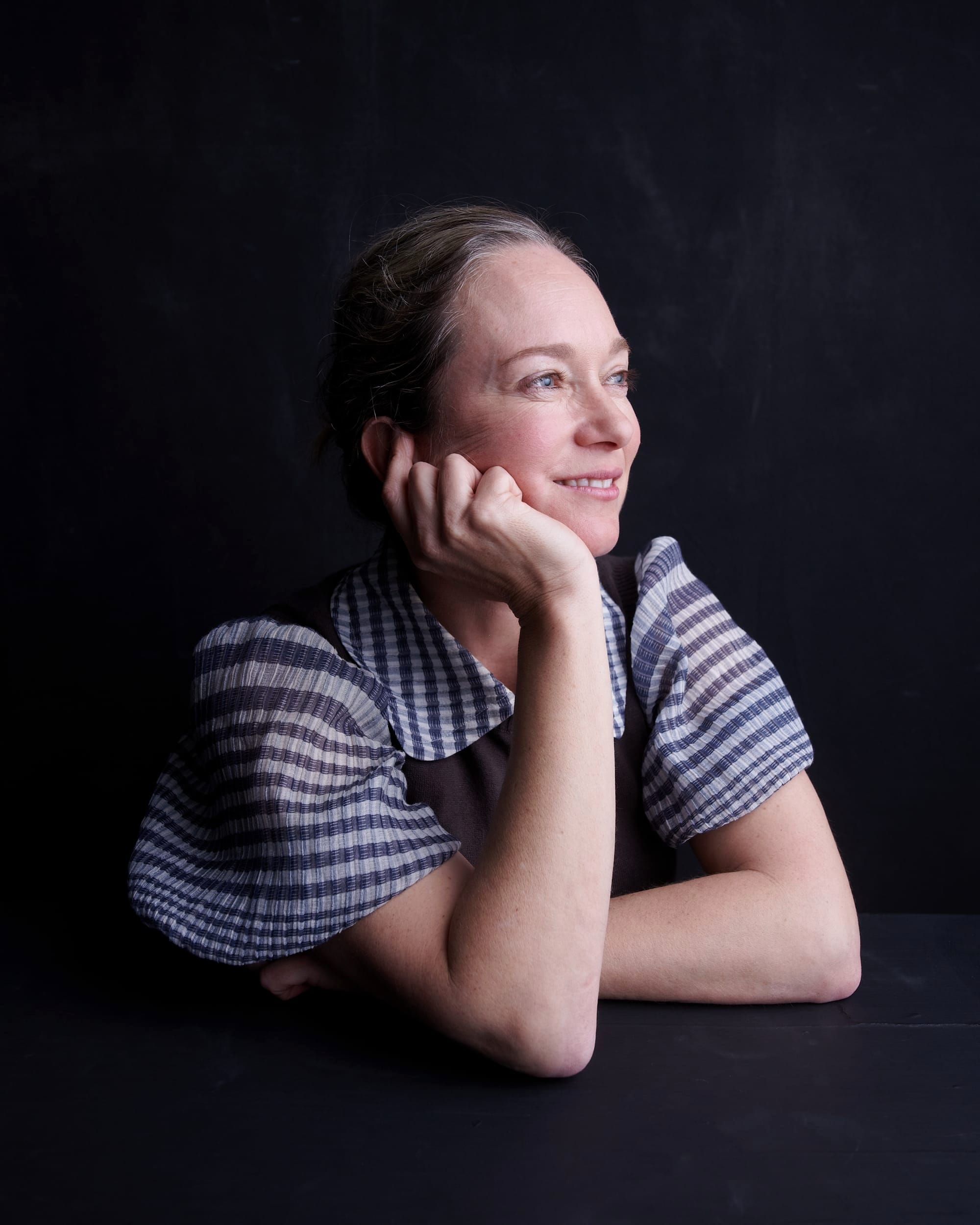
What do you do when nothing is certain? When tectonic plates shift, when it doesn’t rain, when rules change and when marriages end? Galah visits the Murray River community of Barham on the New South Wales–Victoria border to try to find some answers that might help us all.
Words Annabelle Hickson
Photography Lean Timms
ABOUT 25,000 years ago, a seismic shift changed the course of the Murray River. A sudden uplift of land along a fault line in the south-west of New South Wales forced the Murray to veer off in a new 500 kilometre loop, splitting the water from one course into two, creating a floodplain that gave rise to the great red gum forests of the region. It wasn’t the first tectonic shift. I guess it won’t be the last.
Over the past 100 years, the water has shifted again. This time because we started building dams and weirs and locks and channels, and started trading water up and down the river system, changing where the water of the Murray goes. The pendulum has swung from almost all environment to almost all industry and now we’re trying to find a balance somewhere between the two.
We build our lives, our businesses and our communities where the water flows. But geological events, droughts, water policy decisions and climate changes show us again and again that this is not a system set in stone.
Uncertainty is not something that only river communities have to deal with. As
Clint Eastwood says, ‘If you want a guarantee, buy a toaster.’ But our river communities have been through a lot over the past 20 years. I want to ask them how we learn to go about our day-to-day lives, when the foundations on which we build them may—will—shift beneath our feet. So I’m driving out west from Canberra, 600 kilometres towards the New South Wales–Victorian border town of Barham, on the banks of the Murray River.
In June 2019, the Minister for Agriculture, Drought and Emergency Management, David Littleproud, appointed a seven-member independent panel, chaired by Robbie Sefton, to investigate social and economic conditions affecting rural and regional communities across the Murray–Darling Basin. In their final report, released last year, the panel identified a number of regions with acute social and economic conditions, including areas in northern Victoria and southern New South Wales, and remote areas across the northern basin. The Wakool region, in which Barham sits, and the neighbouring shire of Gannawarra, across the border in Victoria, were two of 12 areas specifically named by the panel as being areas of concern.
Through a combination of drought, water reform, commodity prices, technology and other trends like farm consolidation, this region has seen a lot of change. These people know what uncertainty is. But this is not a story about who they can blame; this is a story about who they became.
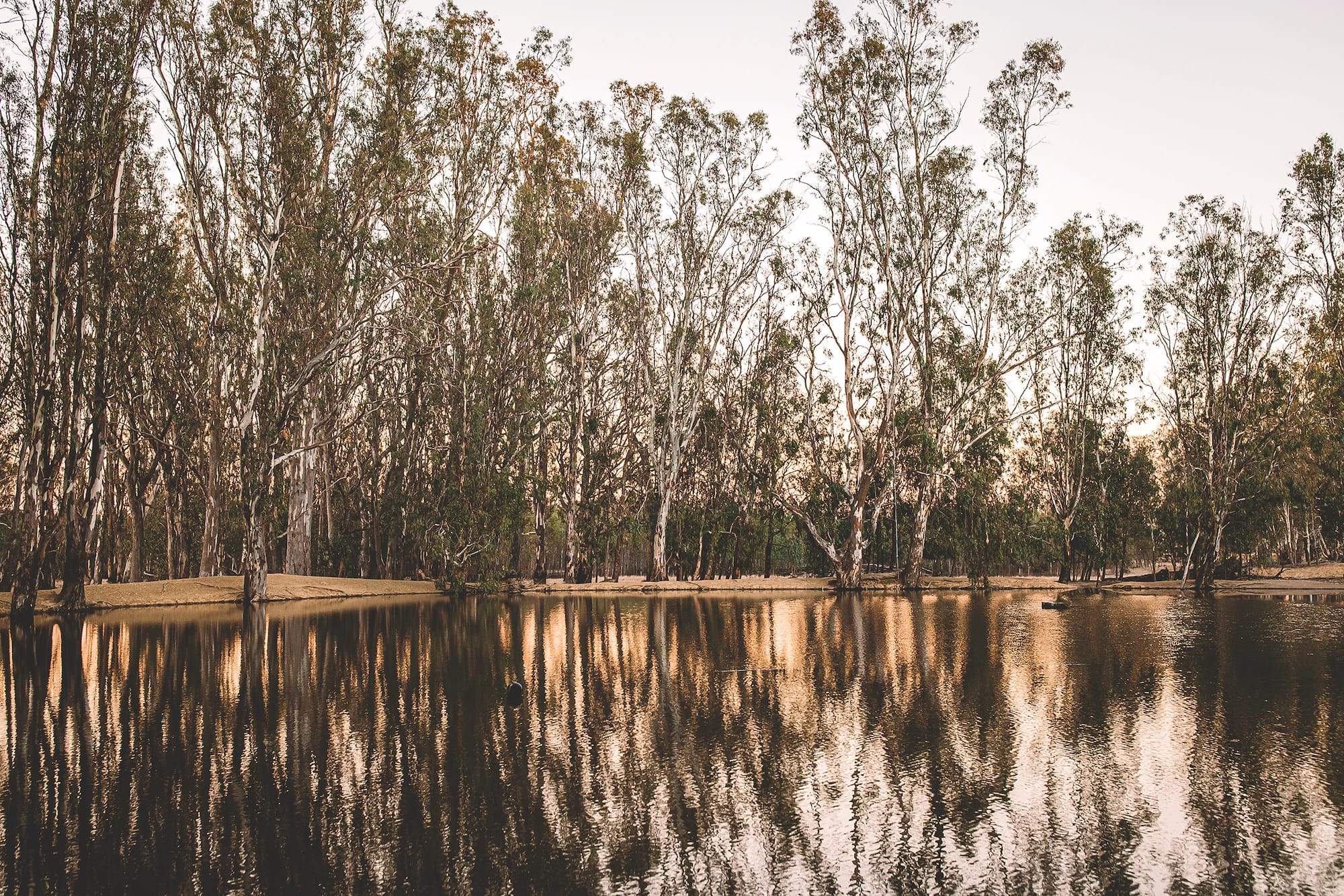
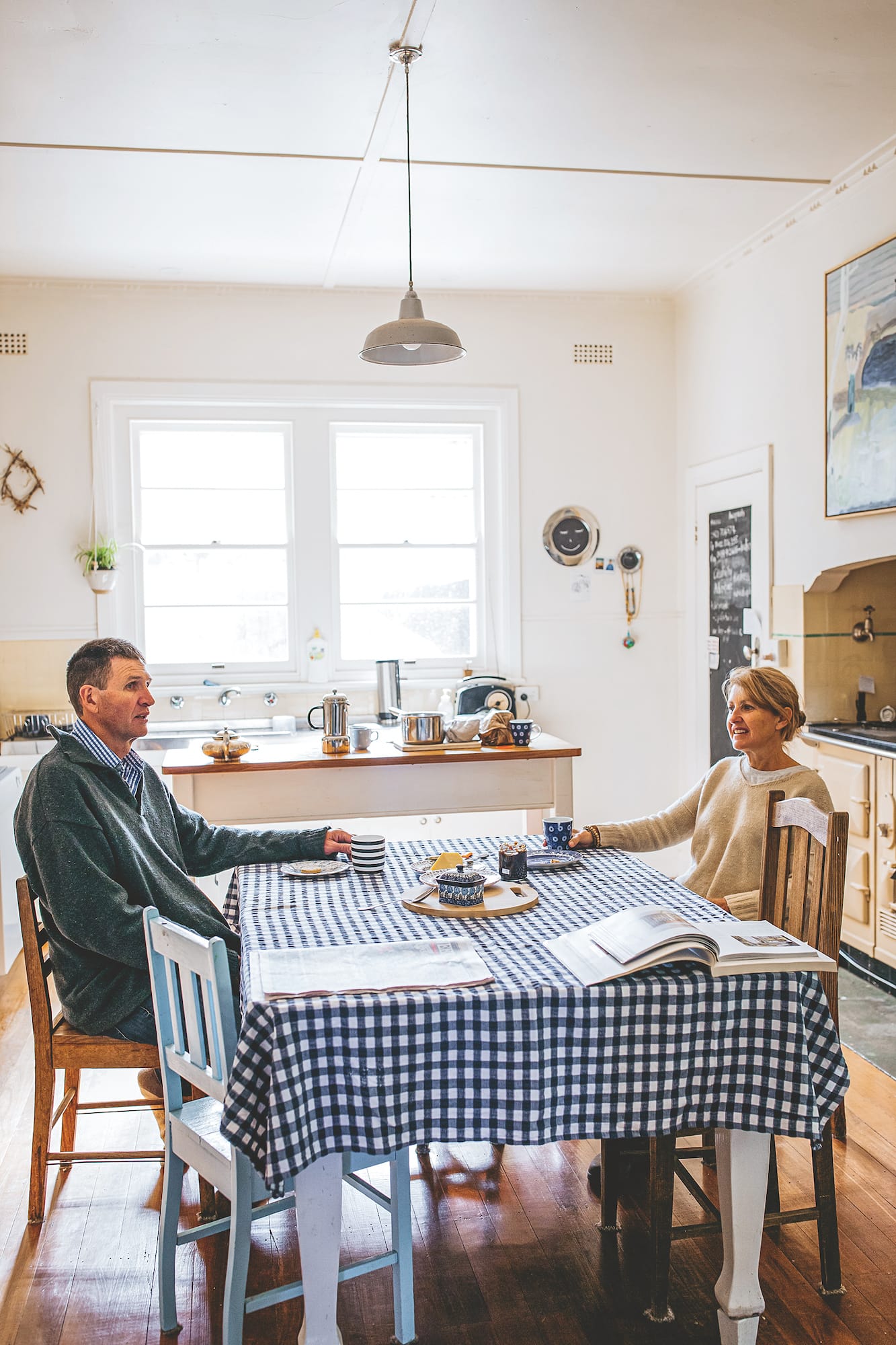
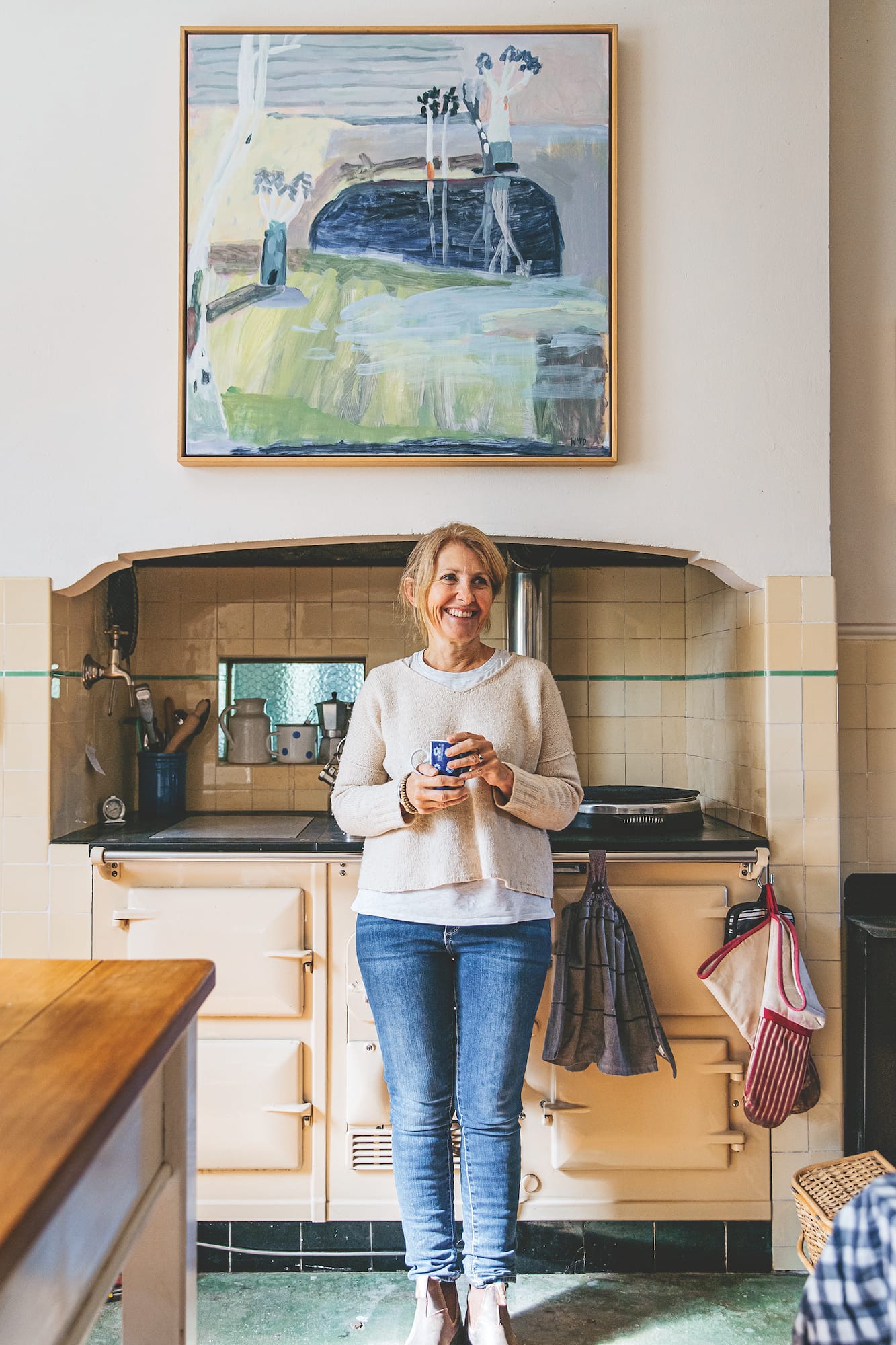
Wendy was a young city girl when she fell in love with Pete McDonald, a fifth-generation farmer from the Barham district. And it wasn’t just Pete she fell in
love with. The ancient landscape around their farm overlooking the Thule Lagoon—the old path of the Murray River before it so spectacularly changed course all those years ago—captured her heart too. She’s spent the past 30 years here raising two children, farming and painting the landscape again and again in her beautiful artworks; each year learning more about the history and geography of the area, each year falling more in love with it.
Today Wendy walks through the ancient riverbed just next to her house, pointing out the different birds she has come to know, looking up in awe at the giant river gums that tower over her small frame. Her love for this place is palpable, although there is a tinge of sadness too.
The past 20 years have not been easy for the McDonalds. They’ve survived two major droughts and water policy changes that, from their point of view, have battered their local environment, community and their farming business. The population of the Murray River valley in which they farm has shrunk by almost 30 per cent. Water entitlements for the region, which before the Basin Plan were just over 500 gigalitres, have been traded for buybacks and efficiency infrastructure and reduced by 30 per cent.
It’s not just the buybacks and allocations, though. Other factors have played a part in the decline. There have been job losses in the forestry industry with the creation of the Victorian river red gum national parks, farms have been consolidating, employing fewer people, and nut plantations downstream have been able to pay more for water on the open market, outcompeting the smaller irrigated rice, cropping and dairy farmers around Barham.
It’s a complicated picture but the result is that, while Wendy and Pete used to make a living off their farm running sheep and using their General Security water to grow rice, they don’t any more. They don’t have the scale to run a dryland cropping farm and they don’t want to invest in another farm. They’d prefer to stay small and look after the land they have.
It was tempting to sell up and move to the coast, but they love where they live. They wanted to stay. ‘You couldn’t find anywhere more beautiful,’ says Pete, standing in the shade of a large pepper tree, looking up at the windmill, the water tower and the big sky above. So Wendy and Pete adapted.
Pete started project managing for local cultural heritage and environmental restoration projects and retrained as a commercial pilot. He’s about to launch a business piloting scenic flights across the central Murray area to the salt lakes at Lake Tyrrell and Lake Mungo further west. Wendy, a talented painter, started exhibiting at a number of galleries and also hosts residential art workshops on their farm.
‘After 30 years, I still can’t believe how lucky we are to be here, even though it’s really tough,’ says Wendy. ‘The changes in water trading policy and the implementation of the Basin Plan immediately after the Millennium Drought, combined with politics and shifts in climate, created a perfect storm of incredibly negative impacts on our environments and communities, both indigenous and non-indigenous. We’re still reeling from these impacts in a deeply personal way. It’s heartbreaking to see what’s happened to our landscape, but to stay here, you have to turn it around and say, “Okay, well, what can we do about it?”’
Wendy and Pete used to get worked up about national and state water decisions. She’d campaign against what she thought was unfair. They attended Senate inquiries, countless consultation meetings and hosted senior bureaucrats at their kitchen table, plying them with tea and orange cake. She says it felt as if she were ‘screaming in space’, where no-one could hear her. Now she’s swapped political advocacy for localism.
‘The environmental changes that we’ve witnessed over the past 30 years, and even the past five years, have been quite frightening. How can you reconcile what you’ve witnessed? How can you handle that in a way that’s going to make you feel empowered and positive? It’s exhausting trying to be a political campaigner and advocate for water. Instead I’m going to do what I can locally.’
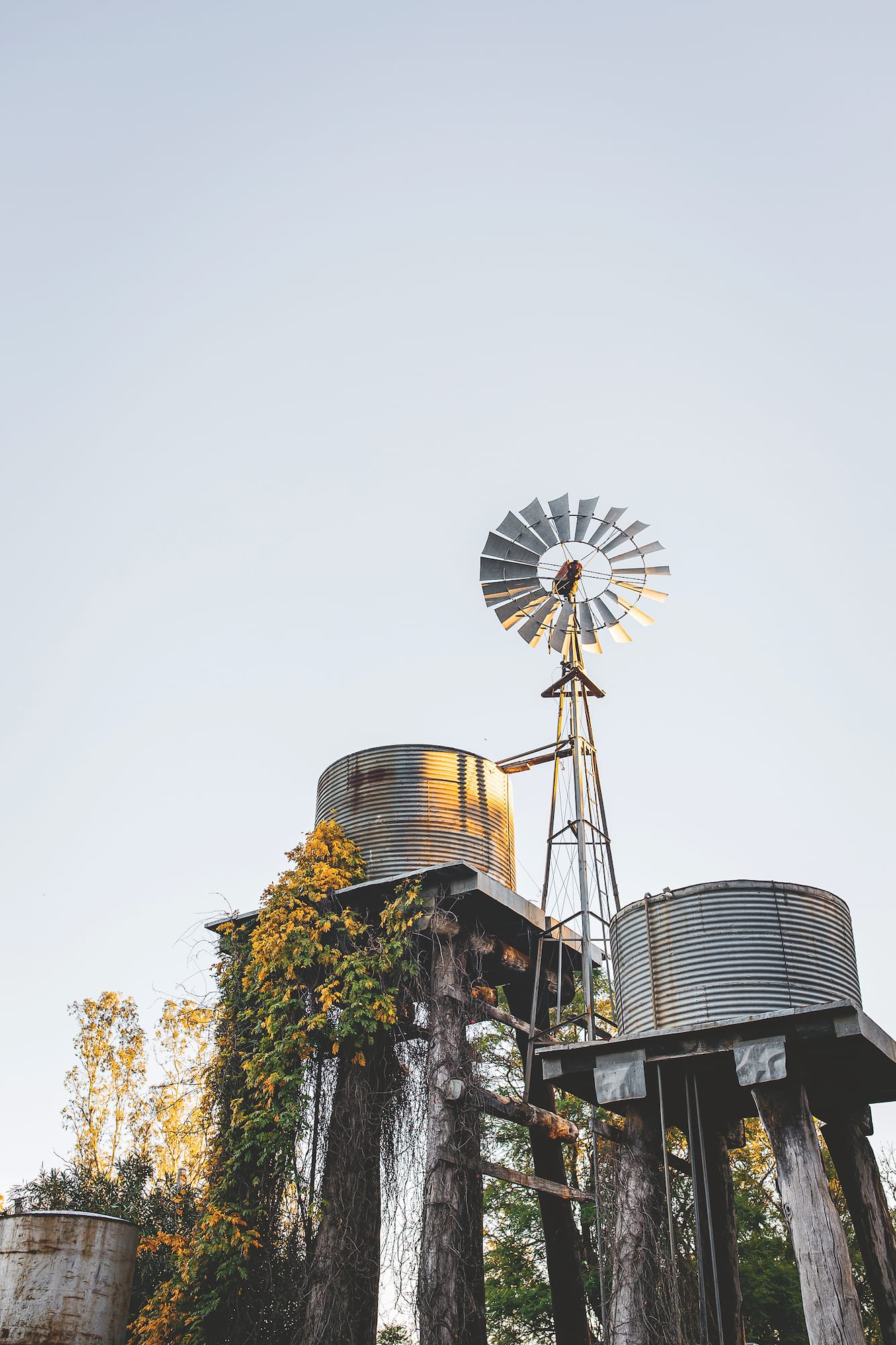
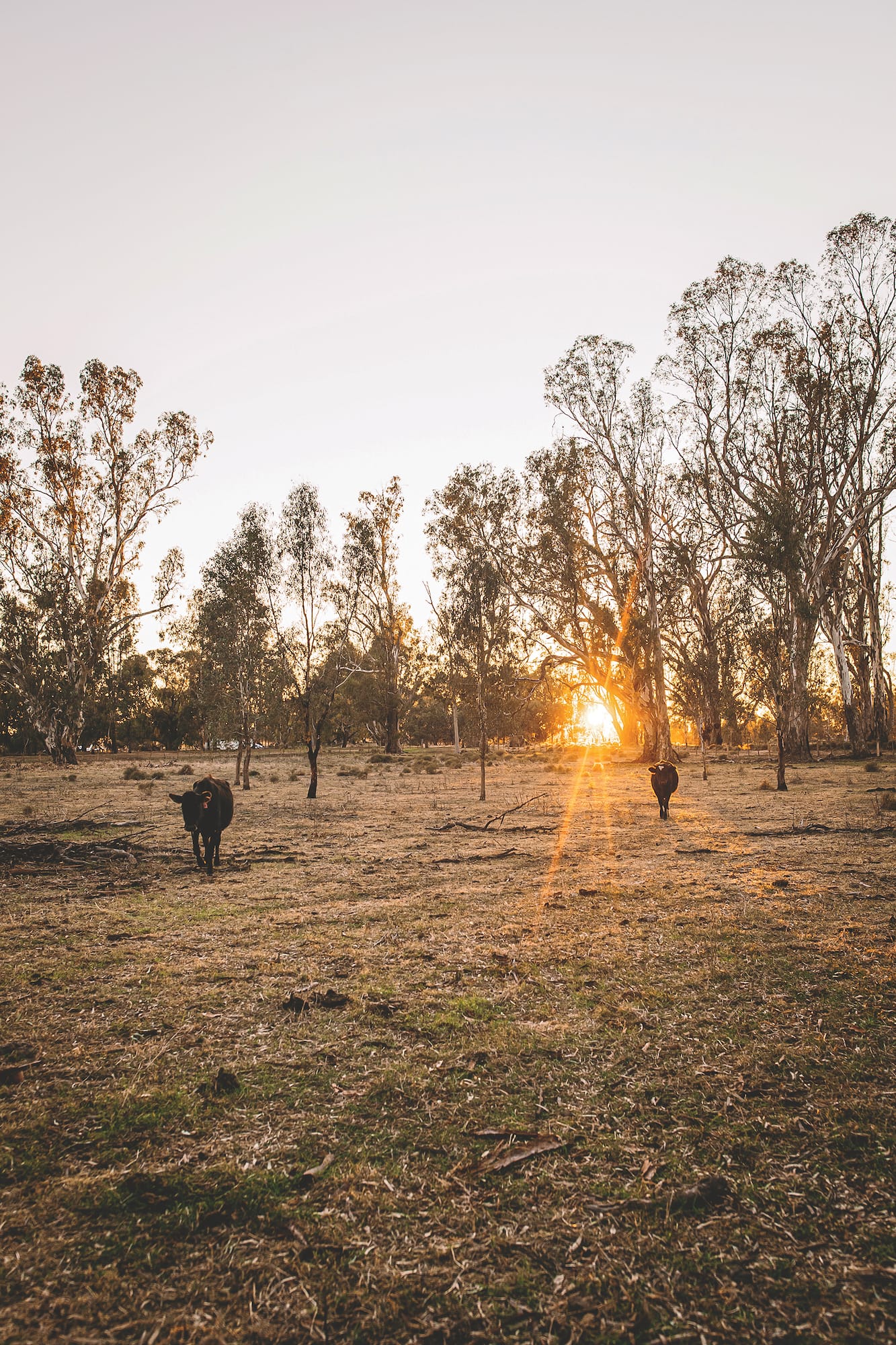
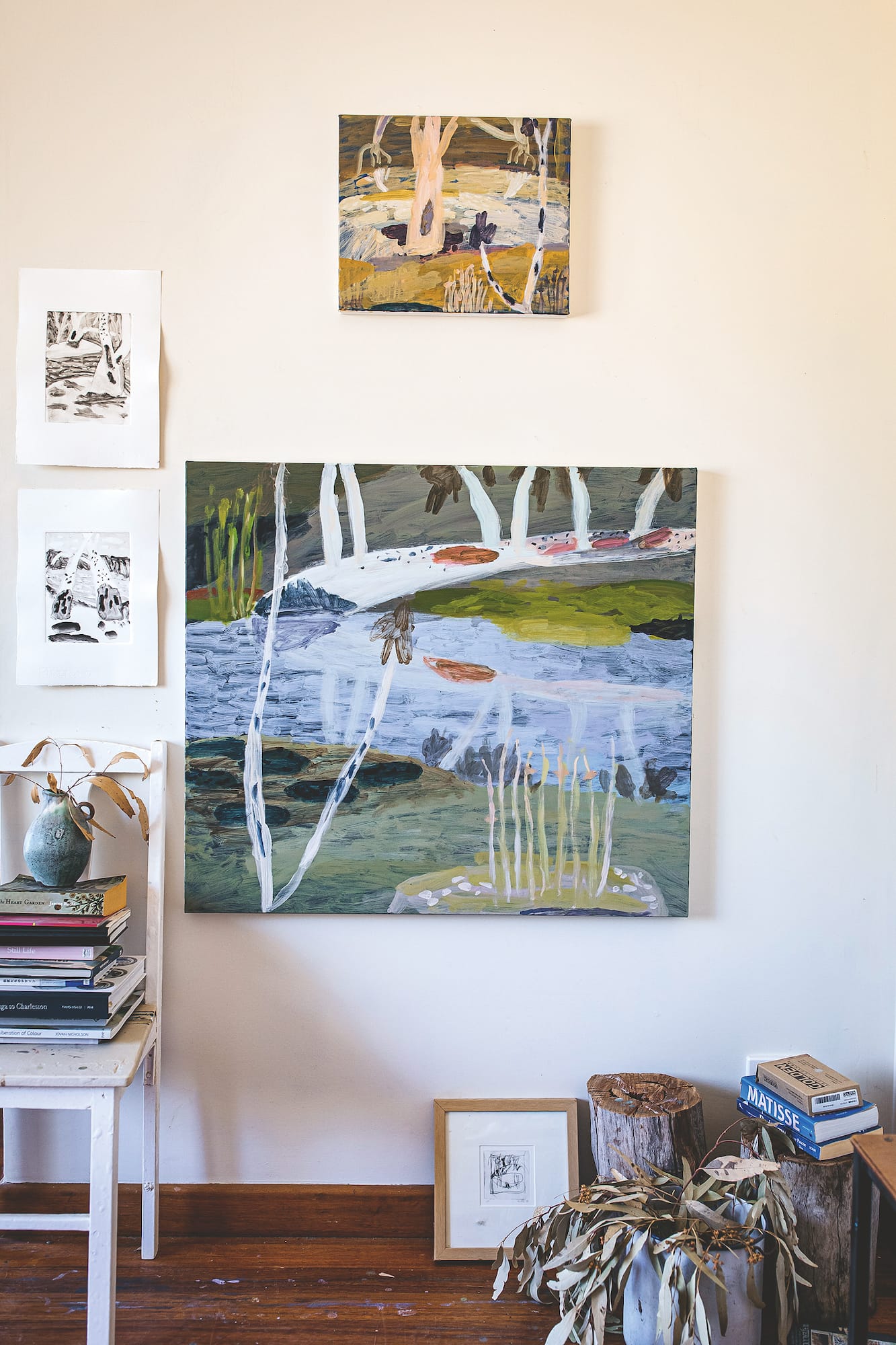
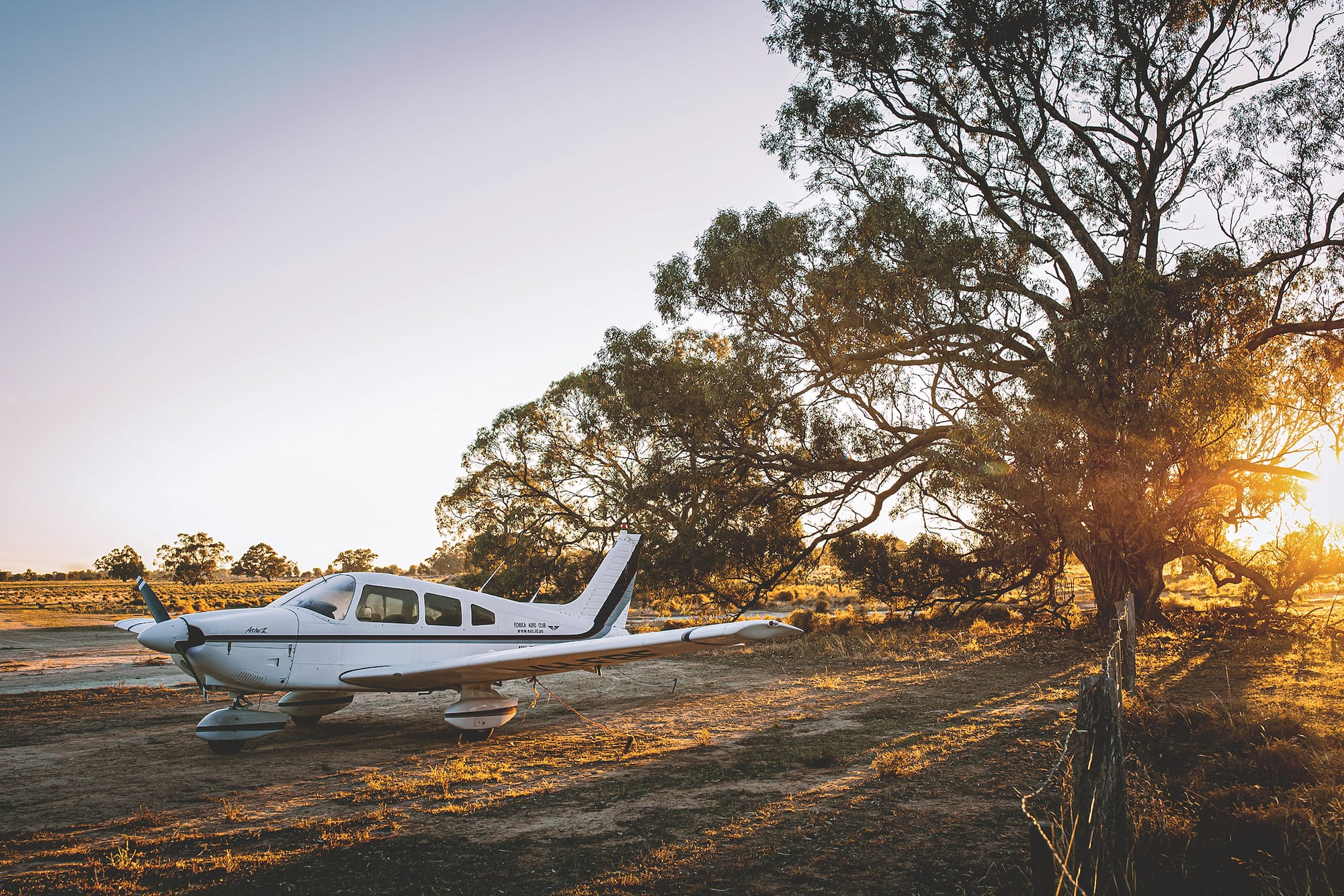
Wendy has become involved with the Western Murray Land Improvement Group, which, among other projects, is working on restoring a 200 hectare Barapa Barapa people’s wetland called the Pollack Swamp. Pete is heavily involved too, working on the environmental restoration of archaeological sites around the swamp, where they have found archaeological evidence of indigenous village and burial sites, dated to within the past 4000 years. They’ve derived a lot of satisfaction from this project. Both of them agree that if the past couple of decades had played out differently, if they had been busy farming, it’s something they might have missed out on.
‘After feeling genuinely voiceless for so long, a renewed sense of localism and enthusiasm for small-scale innovation and ecological restoration, on and off the farm, is pushing us forwards. It’s been healing for us to be involved in these projects and be co-designers of our personal and environmental futures.
‘And through my art I just want to introduce people to these landscapes and the stories from these landscapes so we can have important conversations. That’s what underpins all my desire to paint. You’ve got to find these things to hang onto.’
Wendy is deeply moved by the strong community around her. She starts talking about her friends who are finding their own ways to adapt and thrive. Then she starts talking about the things they do together that are for pure joy. Things that have nothing to do with water policy or business or strategy: the yoga parties, the music concerts, the salami-making days. There’s no sadness any more. She’s radiating love.
‘This is a story about how we’ve reinvented ourselves. Part of that reinvention process has been being able to do things with the community—sometimes a bit crazy. That’s carried us through and given us joy and motivated us to stay here.
‘Come on, you’ve got to meet Graeme.’
And so we jump into our cars, bound for a pizza night at the nearby home of her friends Graeme and Verneice Dick, dust billowing behind us.
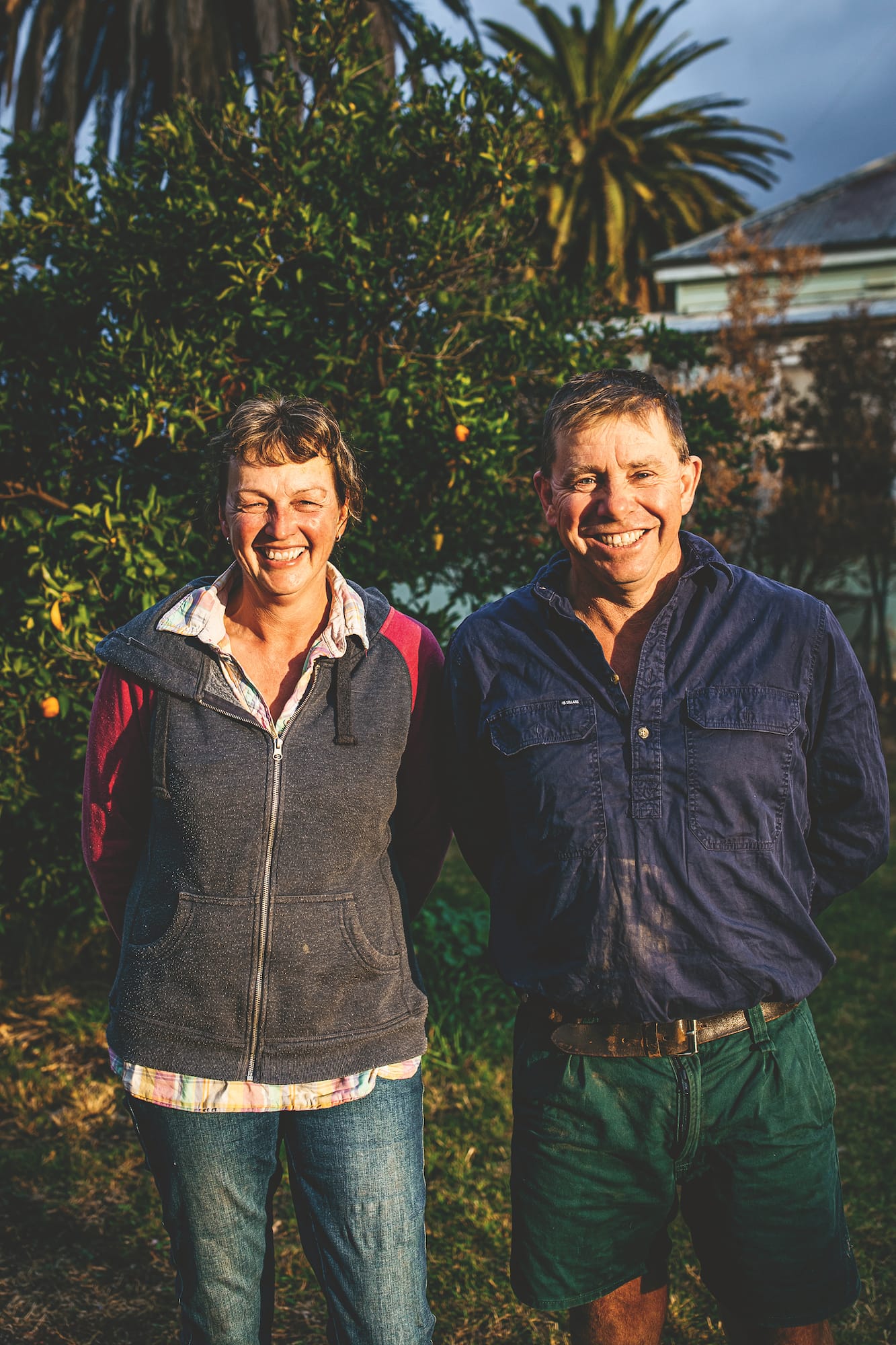
Graeme Dick is a farmer. But he’s also lots of other things. He’s a shearer, a boilermaker, a salami maker, a father, a husband, an inventor. He’s also mad about yoga, he’s a poetry and film enthusiast—he fell asleep at the Deniliquin Film Society’s AGM one night and woke up as president—and he loves literature.
He grew up on the outskirts of Sydney, surrounded by orchards, market gardens, chicken farms and dairies, but for the past 26 years he’s been farming rice and sheep near Barham with his wife Verneice.
‘Verneice and I were married and together we purchased our first farm. Then we bought another block and have never had any money since.’ Graeme is smiling. I don’t think he cares about money too much. He’s much more interested in making things.
Like Wendy and Pete, Graeme and Verneice haven’t always found farming easy. For six years in a row they didn’t have enough water to plant a rice crop. ‘You can do an apprenticeship in four years,’ Graeme adds. But he’s been able to stay positive, largely because he’s kept himself so busy designing and building and making things, specifically in the ‘something out of nothing’ category.
‘Yes, I worry about money. We have debts like everybody else, but we don’t suffer from status anxiety. Look at our farm machinery, stuck in the eighties. It may have been the decade for bad music and scandalous hair styles, but they made some good tractors. And our house is nearly 100 years old. We should be fixing it up, but there are too many other exciting things to build and invent.’
There’s a lot going on at Graeme and Verneice’s place. With materials Graeme’s found or repurposed or been given by friends, he’s currently working on a contraption that can be towed behind a tractor to plant seeds directly into rice stubble: this is not an easy thing to do. He’s got other projects on the go: a meat house, a smoke house and an outdoor bathroom with a space for a fern house and doors made of hanging Rhipsalis plants, handy for when he has lots of guests over for his solstice yoga parties. He’s working on a prototype for a chook house clad in timber offcuts from Koondrook sawmill just across the border. I want one desperately but Graeme roars with laughter: ‘Yeah, but you couldn’t afford to buy one. Nobody can!’ He’s up to his third iteration of a mobile stage with velvet curtains and festoon lighting.
‘There’s so much you can do with nothing,’ says Graeme, beaming.
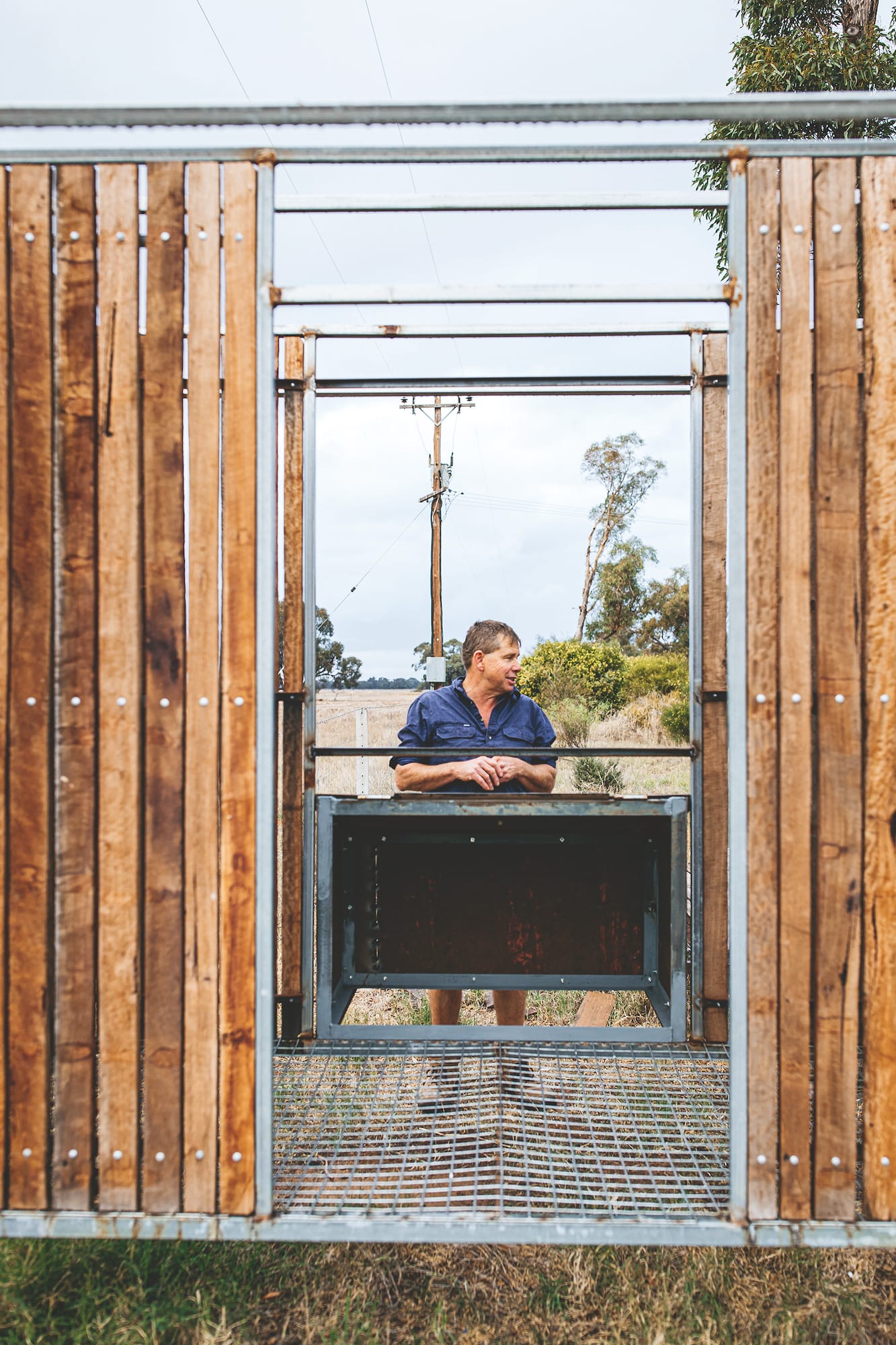
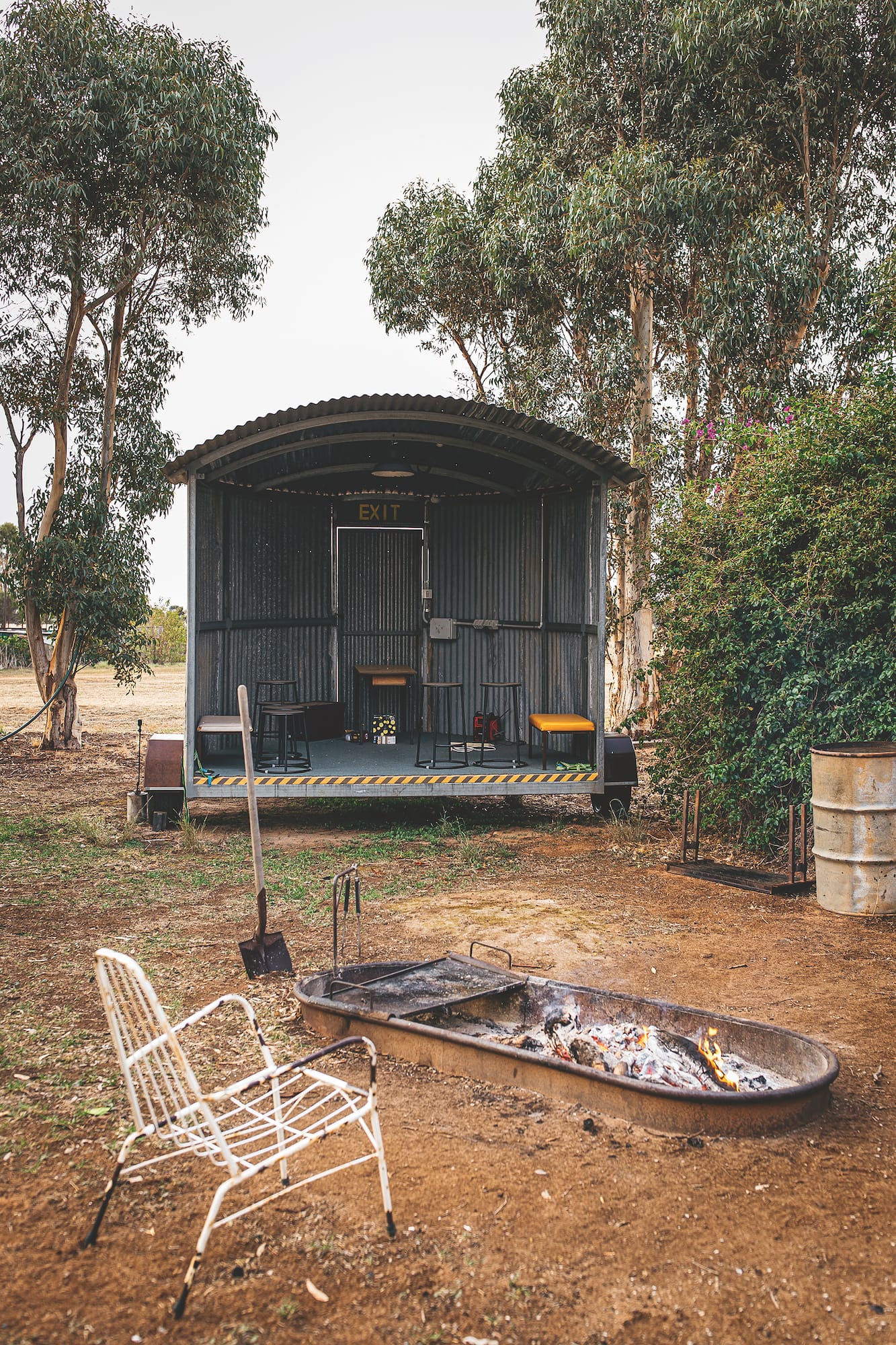
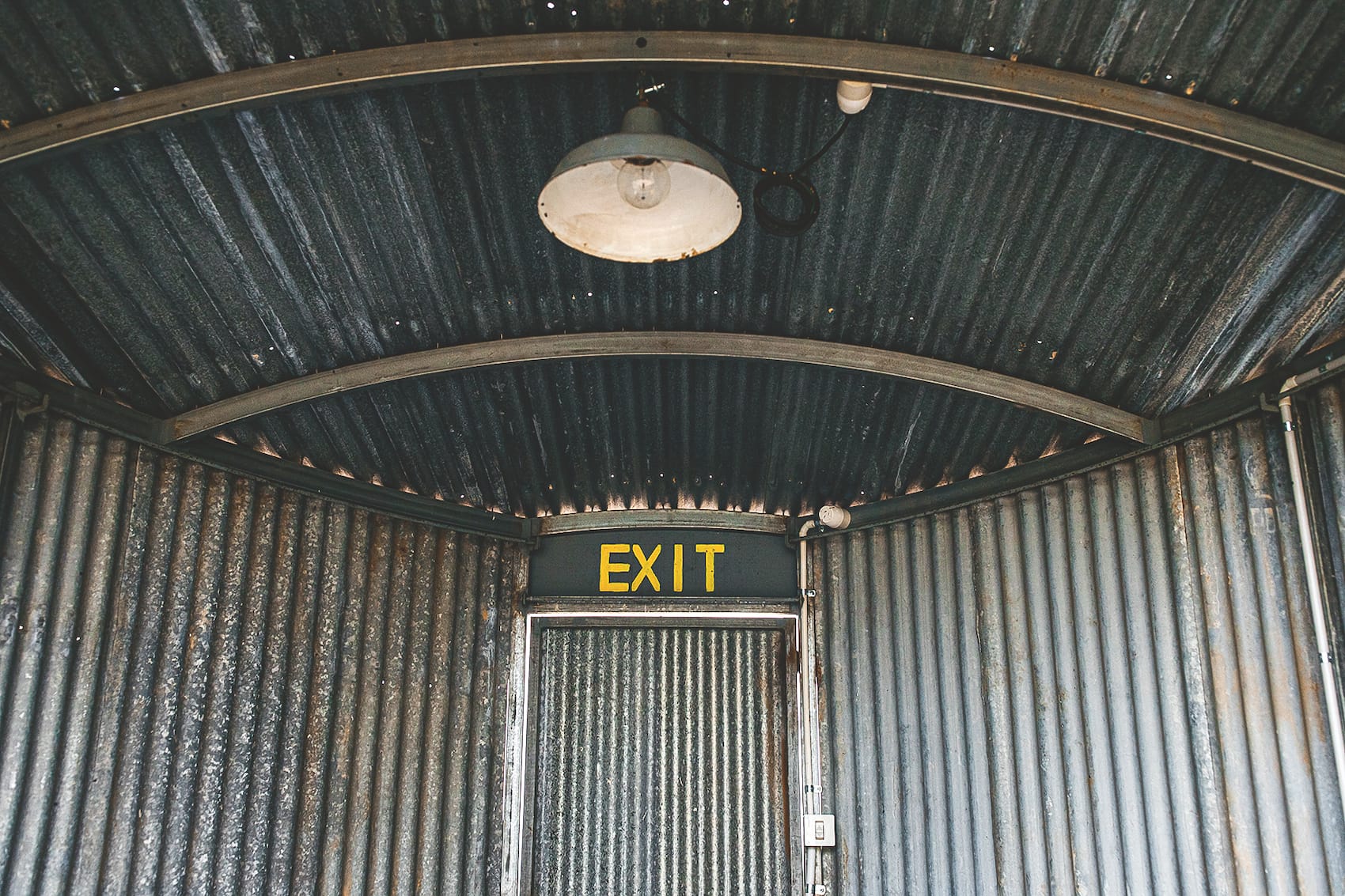
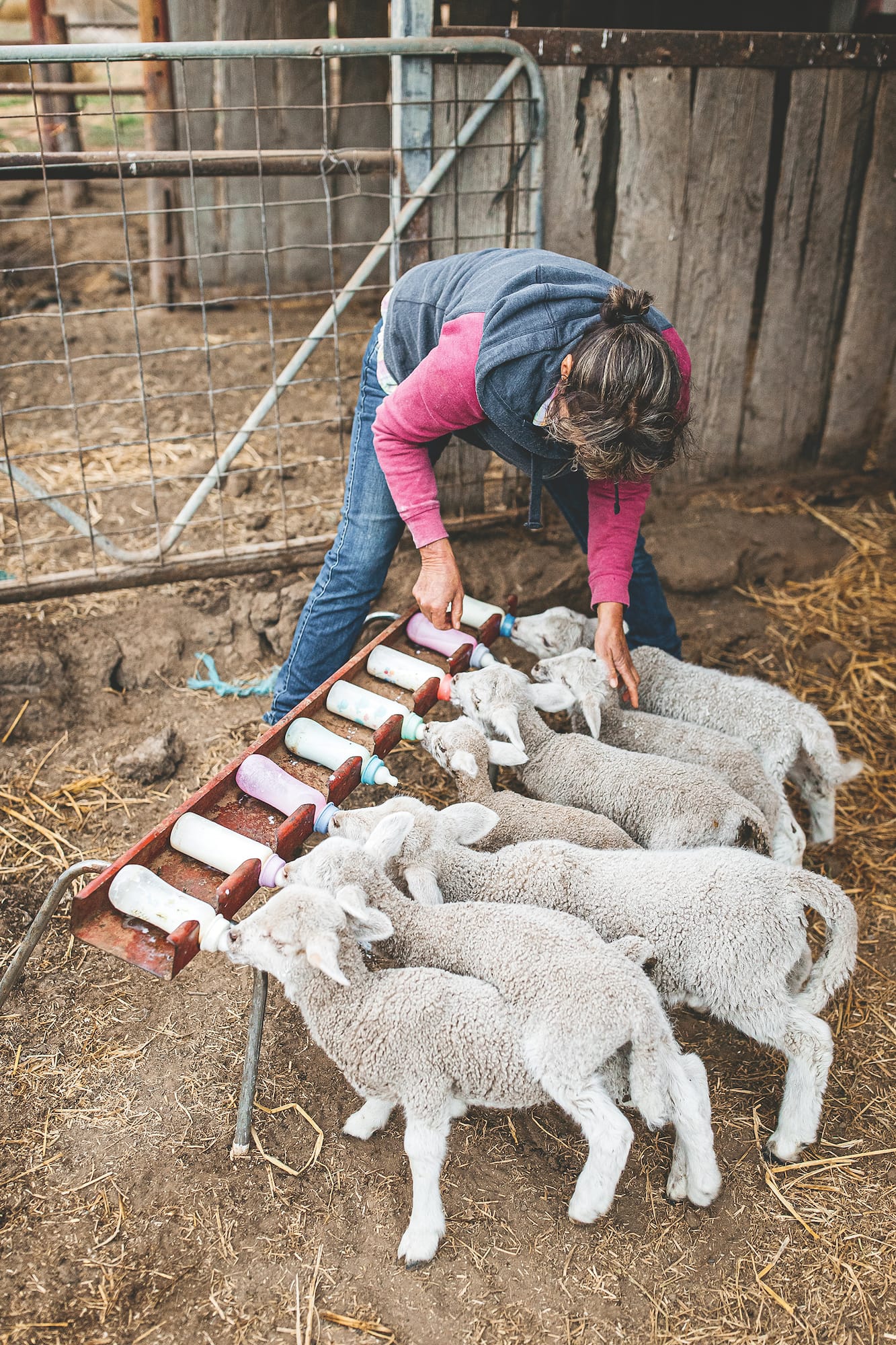
A lot of the things Graeme builds, he shares with his family and friends. The stages on wheels are carted around to whoever needs them. It’s where the teacher leads classes when Graeme hosts his yoga parties (he discovered yoga in his late 40s, when, after years of shearing, his body was starting to fall apart). Wendy and Pete have hosted a viola concert for the community with the stage parked in the Thule Lagoon below their house. The dry lagoon surrounded by majestic river gums acted as a natural amphitheatre, reverberating with the rich sounds of the viola. The stage also gets a workout through the Deniliquin poetry group and the film society.
‘People who sing, dance, people who love poetry, painters, sculptures, theatre, film, writers, creatives, salami makers, yoga. People who garden, grow flowers and vegetables—those are the people who have helped us through difficult times,’ says Graeme. To me it looks very much like a two-way street. Musicians come to play and bring joy because Graeme built them a stage. He’s built the creative life that he wants. And shared it with people he needs.
Melbourne-based singer–songwriter Angie McMahon—google her if you don’t know her; she’s really good—performed a gig on the stage in Barham at the Little Pork Deli a while ago. On her Instagram she thanked Graeme not only for building the stage, but for ‘vibrating joy’.
Making something out of nothing, sharing it and vibrating joy. That seems to be another strategy for dealing with uncertainty.
‘Tell me more about the Little Pork Deli?’ I say to Wendy as we sit around the fire eating pizzas straight out of Graeme’s pizza oven, which Graeme and his family made themselves, of course.
‘You have to meet Lauren,’ says Wendy.
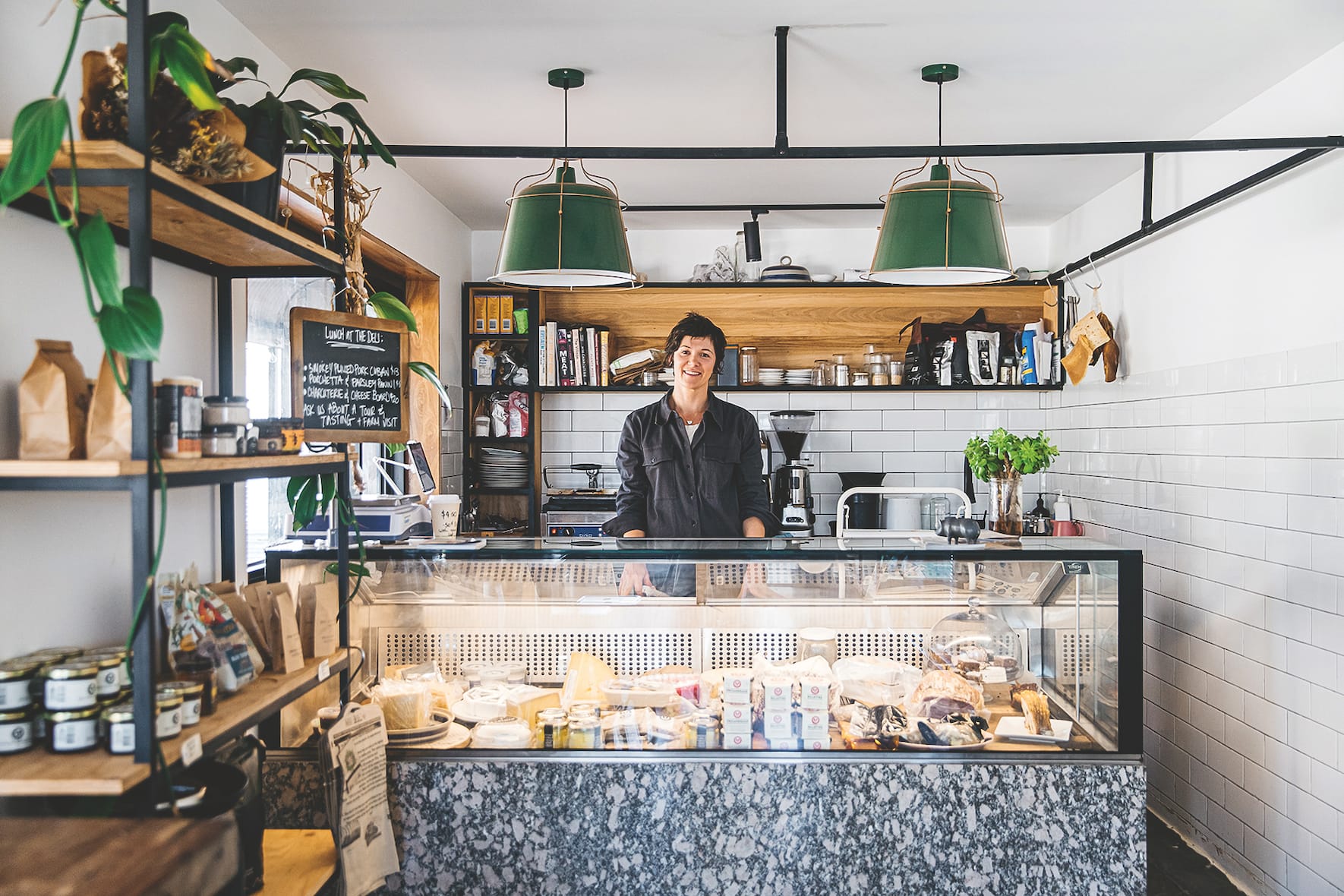
In 2006 Lauren Mathers was working in farming and natural resource management. Her job was to go out and visit farmers. ‘They were whinging about all the water leaving the area and I was like why don’t you just use the little water you have to grow something really high value?
‘I could see farmers that I’ve grown up with—my mum, my dad’s parents, my friends—really suffering, and I said there is a solution: you can do this.’ That’s when Lauren decided to open the Long Paddock Food Store, a shop dedicated to selling local produce. It provided a marketplace for value-added products from farmers who wanted to shift from commodity farming to something more artisanal.
‘Back then there wasn’t anyone really doing this, especially out here. We were getting goats, beef, sheep, eggs, vegies, but we couldn’t get pork. I thought, “Surely it’s not that hard to grow good pork”, so I got a couple of pigs.’
For two years Lauren ran the Long Paddock Food store while learning how to raise free-range pork on her farm. Because the pigs were free-range, she could use water from her stock and domestic licence, without having to buy water. She built a butchery at her home and taught herself how to butcher and make charcuterie. All this with three children and a husband busy with his own transport company.
‘It nearly killed me,’ Lauren says. ‘And then I started dreaming about a tiny little deli where we could bring really high-quality stuff to town.’
Before too long, Lauren had opened the Little Pork Deli on an industrial block in town, complete with a new, larger butchery out the back. Together with her parents Greg and Joan, Lauren now runs 120 free-range sows on 80 hectares, and makes an impressive—and award-winning—array of sausages, bacon, charcuterie, terrines and condiments. Lauren controls all aspects of her pork business, from the farming, butchering, product manufacturing and distribution to customer service. All except the abattoir. But that is about to change. ‘Then it’ll be completely traceable, right through the system.’
Lauren has joined forces with Graeme and Verneice (they run a few pigs to make ham and salami) and 18 other locals to establish a micro abattoir in town. At the moment the closest abattoir is three hours away. There used to be an abattoir down the road in Gunbower, but that closed in 2017. ‘A micro abattoir would mean we’d have to travel 10 minutes to drop the pigs off instead of three hours.’ They have council approval and the zero-waste facility is on track to open next year.
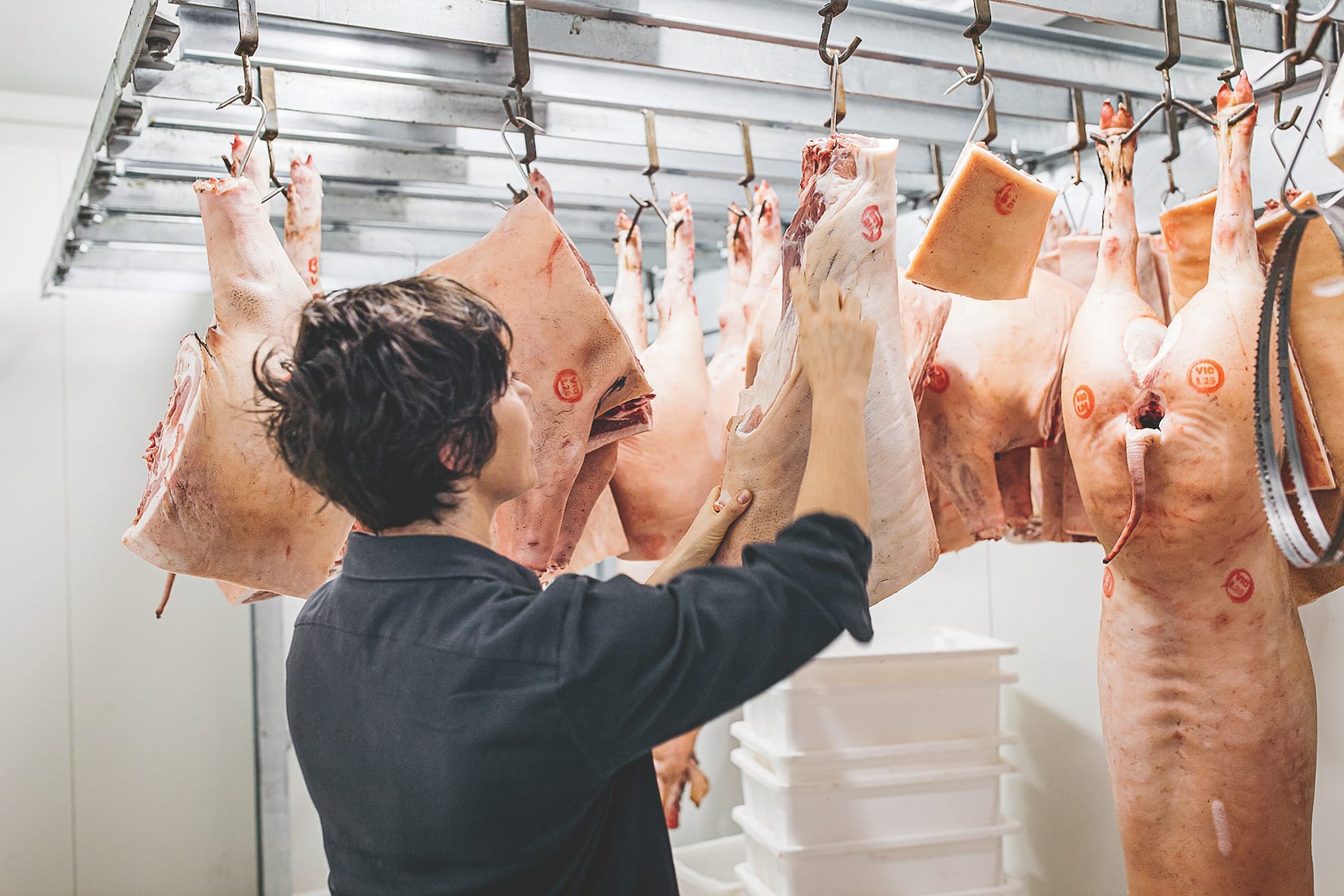
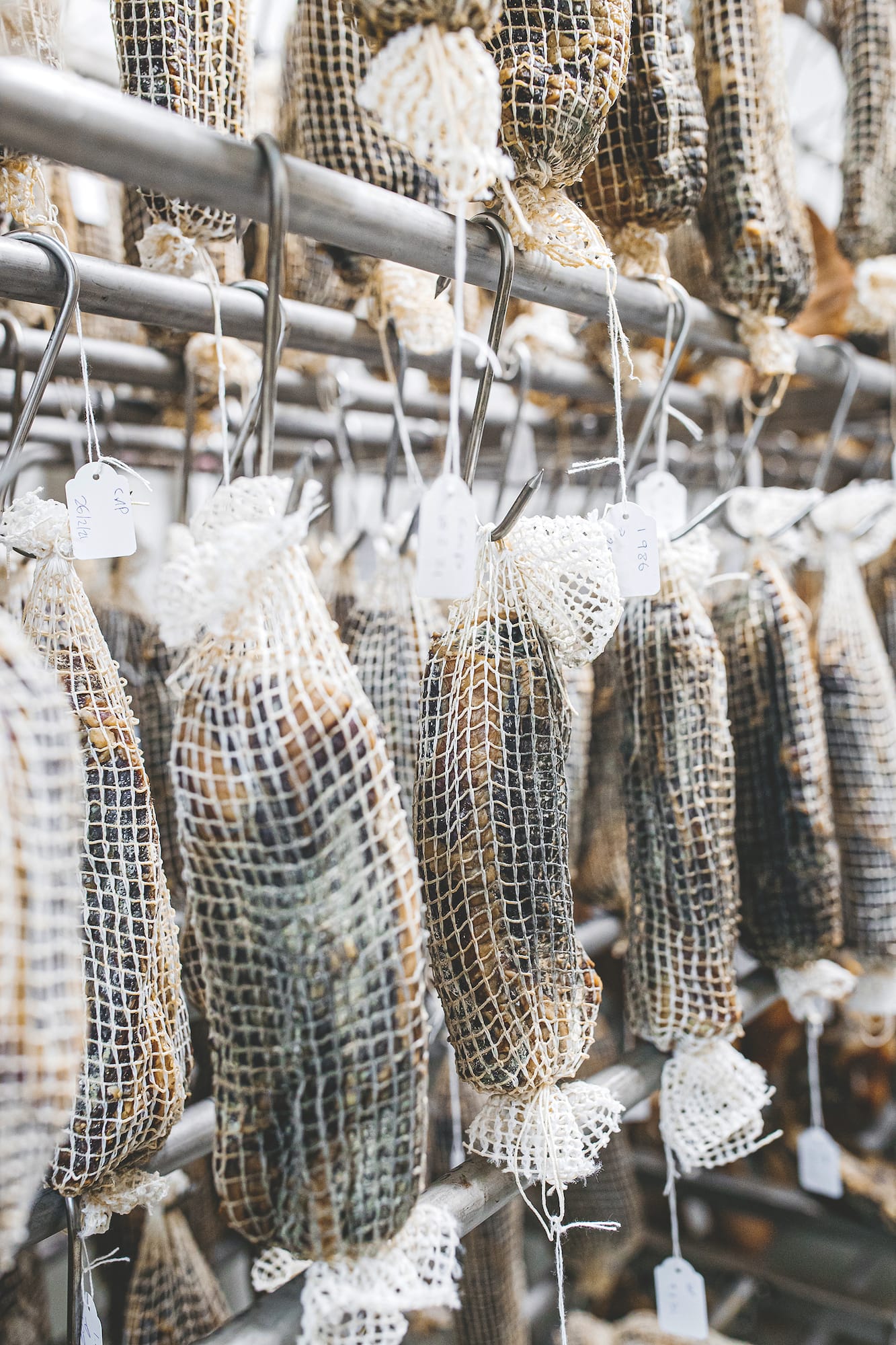
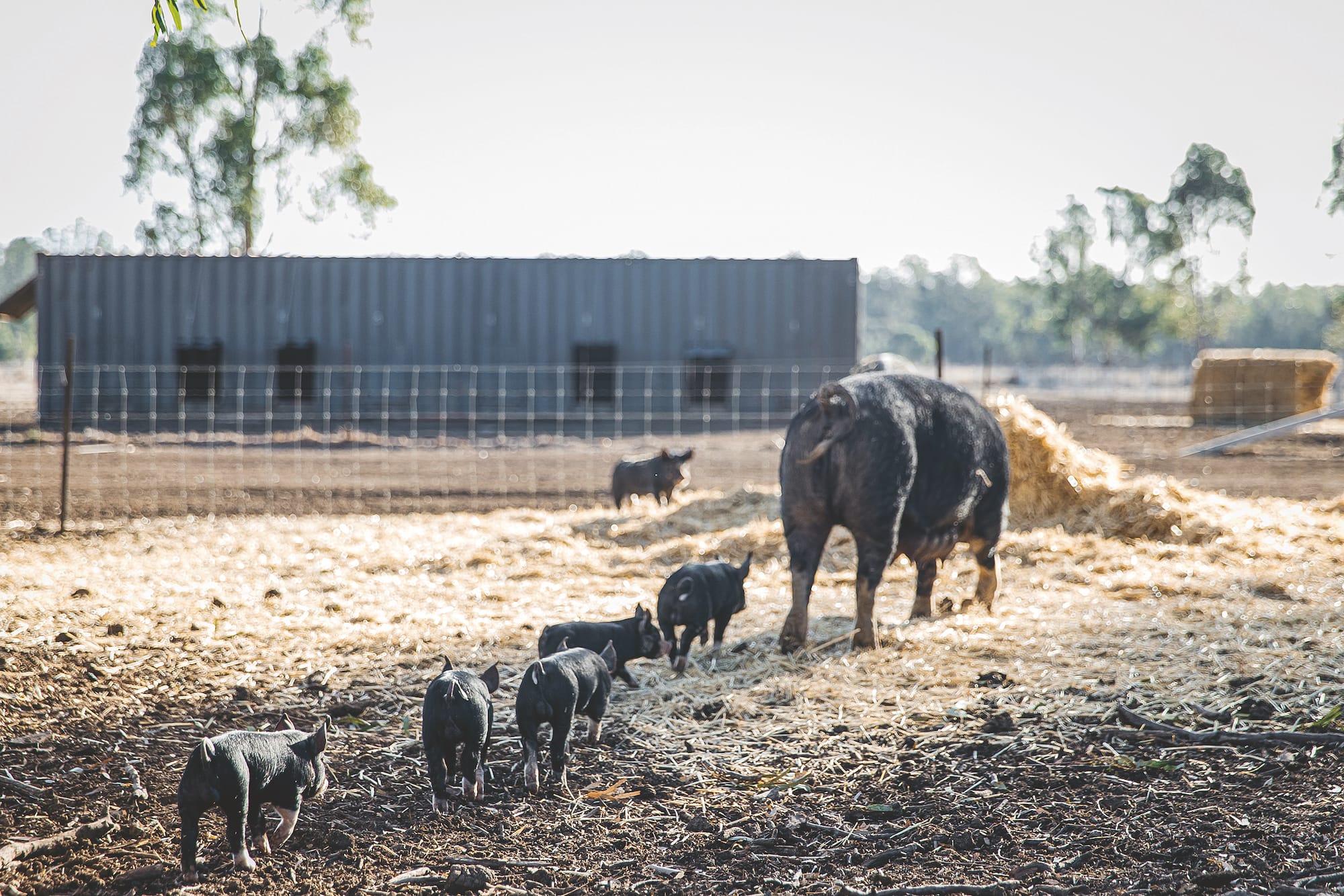
Lauren’s response to the dramatic change in this community over the past 15 years has been to look for the opportunities in the present. Instead of lamenting over what is no longer possible, Lauren poses the question, ‘What can I do?’ She’s smart, she’s ferociously hard working and she doesn’t have time to sit back and complain.
‘We don’t really have any water. And I don’t think we should be pushing to get water back onto the farm because the environment needs it more than us. We can get by without (bought) water. But we do need to seriously think about how we’re going to look after our soil without water.’
Instead of running more pigs with limited water and damaging the soil through overstocking, Lauren said they are looking at other ways to grow, including butchering other farmers’ animals.
‘It’s about how we can best make money without having any more pigs.’
‘We have lots of ideas about what we want to do—eco cabins, music festivals, all this crazy stuff that is not totally related to our business but kind of is. We’ve integrated layers to the business to be more resilient, which allows us to access different markets, and that’s helped us survive drought and COVID.’
We’re driving through town on the way back from her farm. Lauren’s got to pick up the children from school. She’s late, but not concerned. ‘Someone would have picked them up. Look, that’s where Frith lives,’ she adds. ‘There, in that beautiful house on the corner with the garden. You need to meet her.’
And so I find myself knocking on the old timber door of a beautiful weatherboard house owned by Frith, overlooking the Murray with a gang of galahs chattering in the trees above.
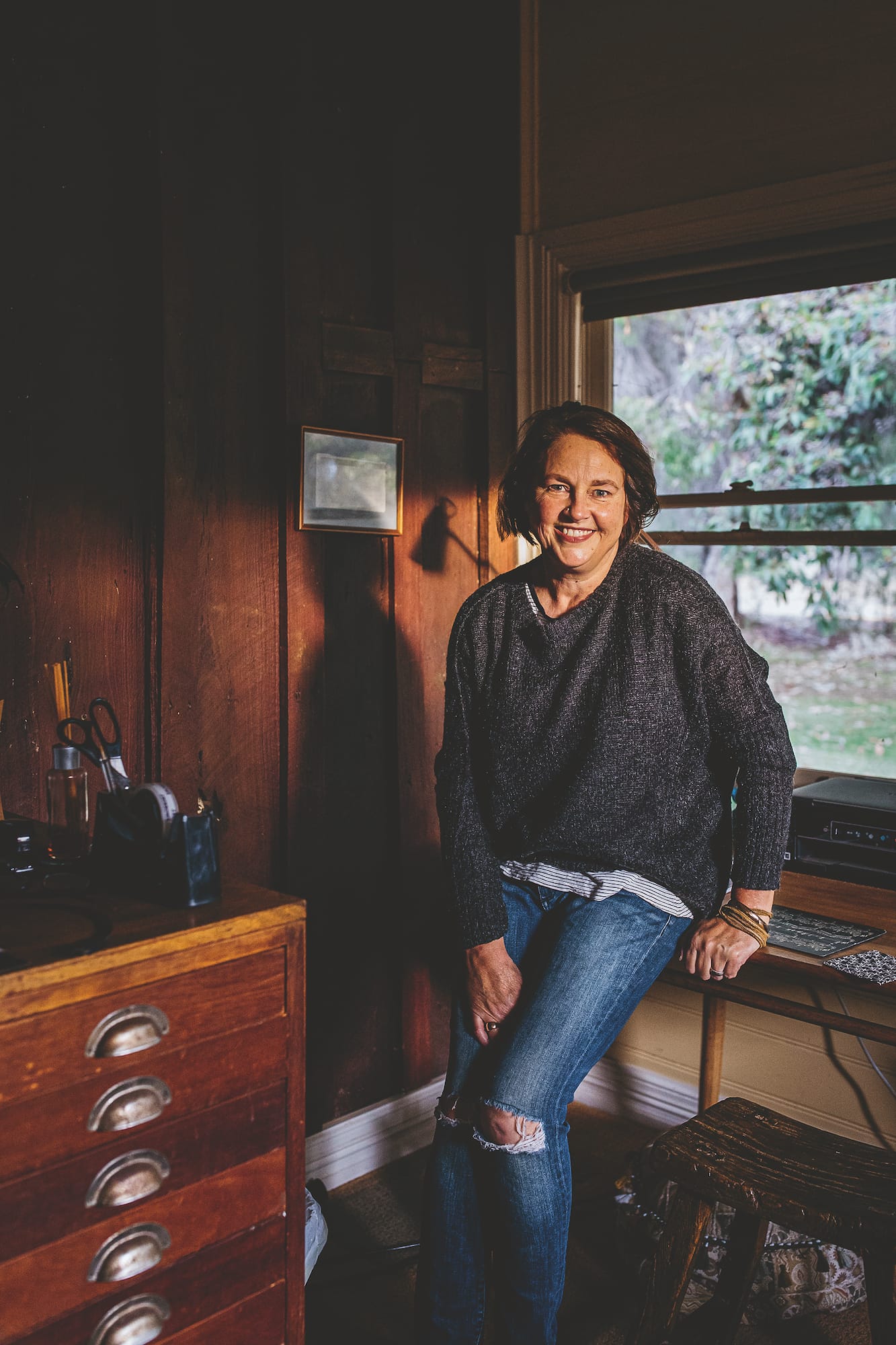
Frith Cheatley never would have guessed she’d be back living in Barham. She grew up on a property on Thule Creek, just down the road from Wendy and Pete McDonald. When Frith finished school she, like a lot of her friends, moved away to the big smoke. She went to university, got married, had children and settled into life in Barwon Heads, Victoria, four hours south. She opened up a homewares store there, and then later one in Barham, which she ran remotely. It was only after her husband of almost 30 years left that Frith—shocked and grieving—started thinking about moving back to Barham full time.
She wanted to re-establish herself somewhere and, although her mother had died and her father had remarried and moved away and was no longer farming in the area, other family and friends were still in the district. On trips visiting her store, Frith had met women from a younger generation who’d moved to Barham and started businesses, women like Lauren Mathers who were doing exciting things in the community.
‘It’s humbling to have friendships with women like Lauren. I’m older: she’s only 40. We’re chalk and cheese but we get on well, and business and family and community are a common language,’ says Frith. ‘Sit down. I’ll put the kettle on.’
On a whim, Frith googled the real estate listings in Barham and discovered that the old Punt House on the river—one that she had always admired—was for sale. The original part of the home dates back to the late 1800s and the study, which looks out through gum trees across the Murray River to Victoria on the other side, is the original Ticket and Customs Office. She made an offer at the top of her budget and, to her surprise, it was accepted the next day.
Suddenly Frith found herself back where she had grown up, in a place where she had always been known as Pat and David Selleck’s daughter rather than somebody’s wife.
‘It all happened very quickly. Some days I think, “What am I doing back in Barham?” Some days I’m in shock. How did that happen?
‘I ride my bike around the familiar, flat, picturesque landscape and I feel joyful. But how can I be? It’s a real conundrum. How can I be happy? My husband left me. I’m teaching again at the school I went to. I’ve asked myself if going back to the place you grew up in is a sign that you failed at life?
‘But I am experiencing happiness here amidst the grief and loneliness. I have history here. I go and play golf with my cousin. And I don’t feel I’ve failed at life. It’s shifted. It’s actually a really strong place: a place to heal but also a place to grow.’
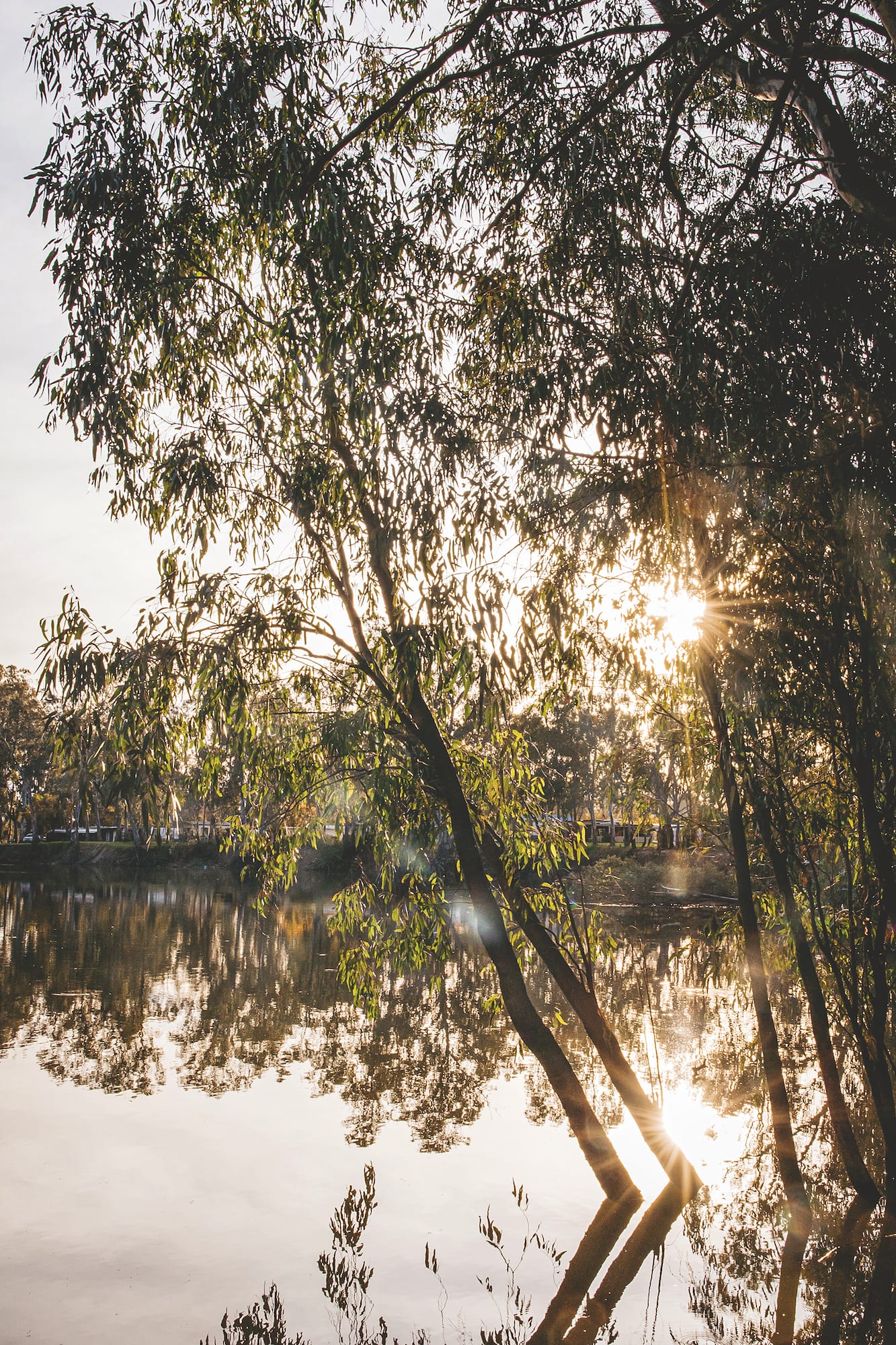
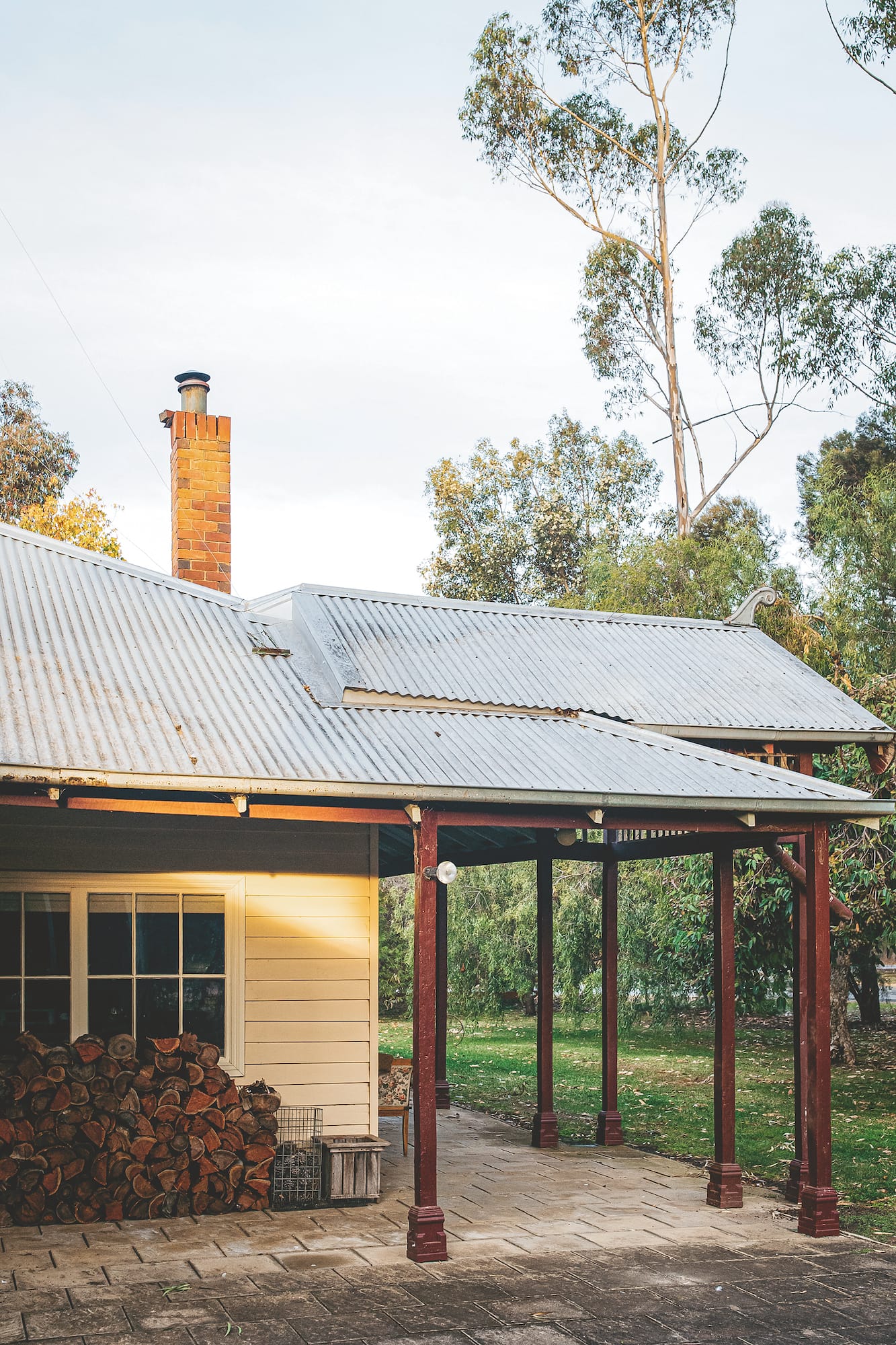
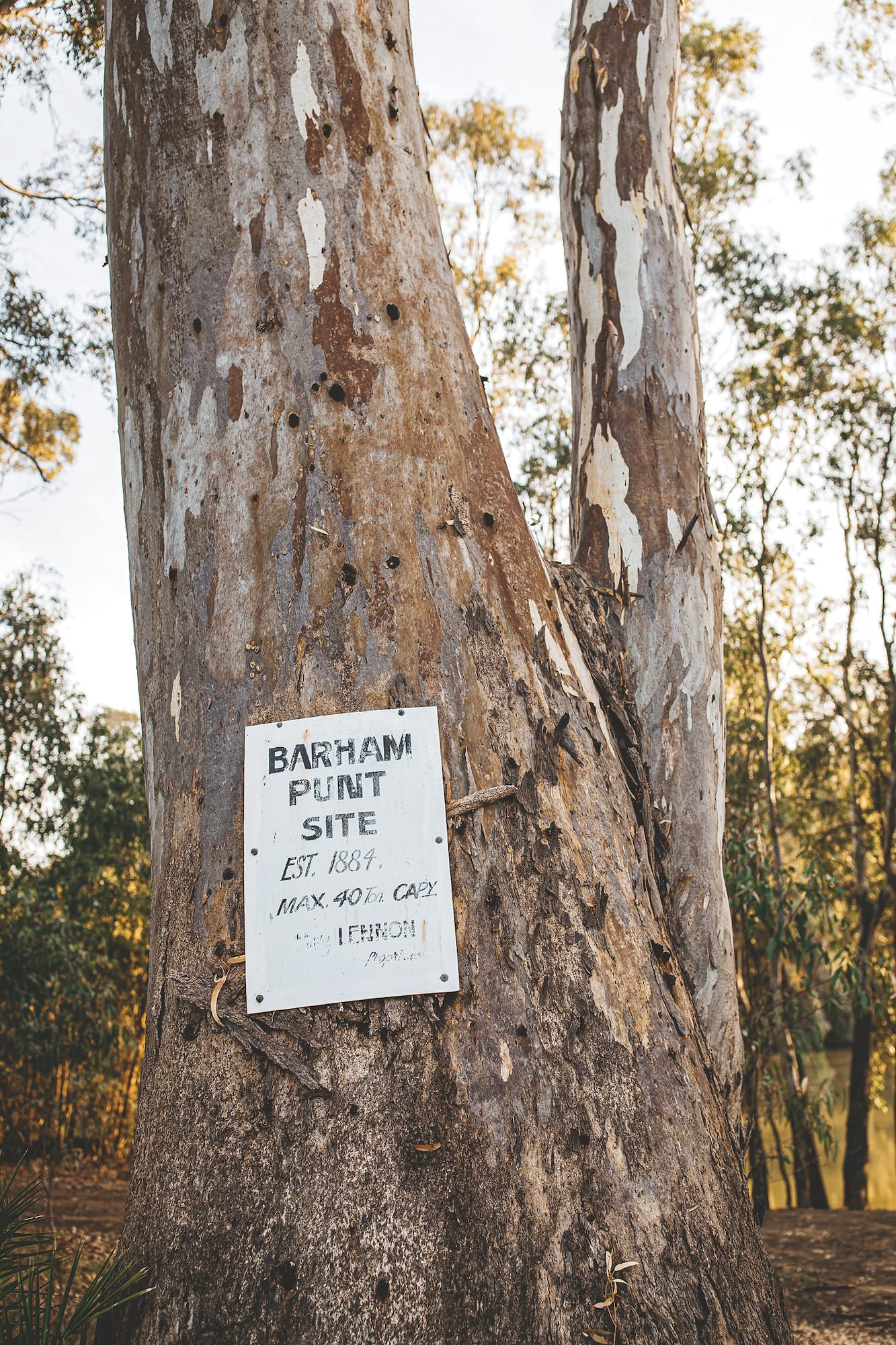
Frith has sold her homewares stores—a friend now runs the one in town—and she works as a casual teacher at three local schools and permanently part time at another. She even replaced a PE teacher for a while: ‘I out-planked the Year 10s. I might have given myself a hernia, but I out-planked them.’
Frith, who was a teacher at a private school in Geelong, loves teaching in the country now.
‘I’m actually teaching the kids of the people who are growing everyone’s food and those that support them,’ she says, smiling. ‘There’s a lot of integrity here. There are very high standards of educational practice, and students who are refreshingly unaware of class and don’t have a sense of entitlement.’
She’s also buoyed by the opportunities the younger generation of women and role models are bringing to the community; people like her good friend Lauren.
‘These innovative thirty- and forty-somethings are so inspiring. I love seeing them bringing life back to the community. It’s so different now. When you think about it, we didn’t have the internet so we really were cut off, even 20 years ago, whereas country people now have the world here on the computer in their study, office or kitchen bench.
‘They’ve travelled, worked elsewhere, they’ve been off and done other things, but they’re choosing to live here, they’re choosing for their children to go to the local schools, to be able to ride their bikes around, to go out on Friday night to have dinner at the pub or a barbie boat on the river. They’re creative, they’re innovative. It’s exciting.’
Frith talks about a Friday night a little while ago when she came home from work to a lovely but empty house. She was feeling lonely, but then Lauren called, inviting her to an outdoor screening of the movie Red Dog in the park. ‘We’ll be coming down the river in our boat in 10 minutes and can pick you up on your
river bank,’ said Lauren.
‘It turned me around,’ says Frith. ‘Later that night, I was sitting under the stars watching the movie with Lauren and her husband and family. It was lovely to be included and I felt blessed and happy. It’s not who you are or what you’re wearing or what you’re driving, it’s actually just people. That’s all that matters.’
For Frith, coming home and freeing herself from her expectations of what she should and shouldn’t be doing has helped her deal with the change that she did not ask for. She’s steadying herself here in this new–old world, and in it she sees a lot of hope and a lot to feel excited about.

We don’t know what’s coming in the future. The tectonic plates might shift, our
marriages might end, the water might vanish and our businesses might change. The people of Barham have taught me that you can live with great dignity in the face of this uncertainty. You do what you can with what you have. You hold the hands of the people around you while you adapt. You make things, you fix things, you listen to music and you tell stories. And you build stages and put them on wheels so they can go wherever they’re needed, wherever the water takes them.
I spoke to Wendy and Pete the other day. They had good news. They’re a trial farm for a new farmer’s mutual program—Regen Farmers Mutual—designed to link farmers like Wendy and Pete to environmental markets and provide them with a supplementary income.
‘It’s sort of like the carbon schemes that already exist, but without the middlemen,’ says Wendy. ‘The idea is to empower the farmer and put the bulk of the money back into local communities.’
Wendy was especially excited that the Mutual was working on a model to value components beyond soil carbon. ‘They also want to value biodiversity, and people: who you employ and how embedded you are in the community. It’s really exciting.’
I hang up and wonder if this might just be the beginning of a new tectonic shift that changes the river once again. I hope so.